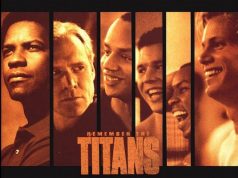You could go into “The Express” knowing nothing about its subject, late-’50s college football legend Ernie Davis, and still guess what’s going to happen many scenes before it does. It’s pointed out several times that no black athlete has won the Heisman Trophy, so obviously Davis is going to win it. He gets a mysterious nosebleed one night in the locker room, and everyone knows what happens to movie characters whose noses bleed unprovoked. (Hint: It’s the same thing that happens to movie characters who cough for no apparent reason.)
The problem, of course, isn’t that Davis’ life was predictable or boring, it’s that the cinematic retelling of it makes it seem like it was. The fact that Davis won the Heisman is common knowledge and obviously should be part of the story. But why telegraph it so bluntly beforehand? Why belabor the point with such heavy foreshadowing? That’s just bad storytelling.
Most of “The Express” is like that: earnest and well-meaning, but utterly weightless. It shows no nuance between the good guys and the bad guys, and any obstacle that presents itself is quickly overcome. It’s the kind of movie you feel bad criticizing. It hasn’t done anything TERRIBLY wrong, but it hasn’t done anything terribly right, either.
The story starts with Ernie Davis as a child (played by Justin Martin), discovering he’s great at running when a group of racist white kids threatens to beat him up. Racism becomes the film’s recurring theme — and, if it weren’t for Davis’ post-college illness, it would be the film’s only theme.
A high school sensation in Elmira, N.Y., Ernie (now played by Rob Brown) is recruited by many colleges but eventually goes with Syracuse University because it’s the alma mater of his idol, Jim Brown (Darrin Dewitt Henson). The coach at Syracuse is Ben Schwartzwalder (Dennis Quaid), presented here as an amalgam of all tough-but-fair movie coaches. The first few times we see him, his face is hidden from the viewer. It’s not until he watches footage of Ernie Davis on the playing field that we’re allowed to see him head-on, wearing an expression of awe and wonderment. It’s as if Coach Ben Schwartzwalder doesn’t truly exist until he sees Ernie Davis play.
Ernie is one of three black players on the Syracuse team. One of the others, J.B. (Omar Benson Miller), becomes his requisite fat, funny sidekick; the third one is mentioned and shown a couple times but never figures into the story. (It’s just as well, since there are only two black women on campus, and they’re needed for Ernie and J.B.) A couple of the white players resist Ernie’s inclusion, but they get over it when they see how good he is. The 1959 season becomes the team’s best ever, even as Ernie faces racism wherever he goes. In the background, the early stirrings of the Civil Rights movement can be seen.
Directed by Gary Fleder (“Runaway Jury”) and adapted by Charles Leavitt (“Blood Diamond”) from Robert Gallagher’s book, the film is awash in aphorisms and clichés. The coach and Ernie’s wise old grandfather (Charles S. Dutton) say things like “What kind of man are you?,” and Mark Isham’s musical score is perpetually in Inspiring Sports Drama mode, with all those stirring violins and pounding timpani. Everyone is prone to giving impassioned speeches, the likes of which you have previously heard in whichever Inspiring Sports Drama was the last one you saw.
Rob Brown is a reasonably talented actor who has so far been stuck in forgettable, blandly inspiring C+ movies like “Coach Carter,” “Take the Lead,” and “Stop-Loss.” That streak continues here. Whatever fire dwells in his belly is tamped down by a movie that won’t let him be a real person. This is such a gentle, cautious, glossy biography that it borders on idolatry. You don’t need to manufacture dark corners of Davis’ life if there weren’t any, but you don’t need to make him into a noble, unflappable, always-right Boy Scout, either. People can’t relate to a character like that. It’s the complaint many people have had about Superman over the years. If he never does anything wrong, and if nothing can stop him, then what’s interesting about him?
The thing is, I suspect Ernie Davis really was an interesting person. He certainly led an interesting life. That’s all the more reason for being disappointed in “The Express,” as it reduces him and his accomplishments to mere plot points. His powerful devotion to his grandfather is hinted at but barely addressed, just as his struggle to support the Civil Rights movement without rocking the boat on his scholarship is mostly overlooked. The film is based on a true story, but it might just as well have been based on “Remember the Titans” or “Glory Road.”
C+ (2 hrs., 9 min.; )




